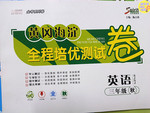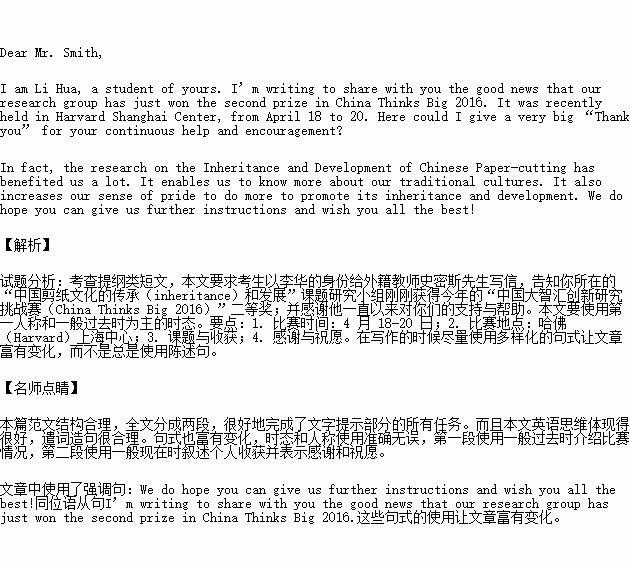题目内容
书面表达
假定你是李华,你所在的“中国剪纸文化的传承(inheritance)和发展”课题研究小组刚刚获得今年的“中国大智汇创新研究挑战赛(China Thinks Big 2016)”二等奖。请你写信给你的外籍教师史密斯先生,感谢他一直以来对你们的支持与帮助。要点如下:
1. 比赛时间:4 月 18-20 日;
2. 比赛地点:哈佛(Harvard)上海中心;
3. 课题与收获;
4. 感谢与祝愿。
注意:1. 词数 100 左右;
2. 可适当增加细节,以使行文连贯;
3. 信的开头与结尾已为你写好。
Dear Mr. Smith,
I am Li Hua, a student of yours.
Yours,
Li Hua
 黄冈海淀全程培优测试卷系列答案
黄冈海淀全程培优测试卷系列答案假定你是我校高三学生李华,在学校看到如下通知,请根据通知的内容和写作要点向学校写一封申请信:
HOST FAMILIES WANTED Teachers and students from Central High School phoenix will visit our school two weeks later. Host families are wanted to accommodate our friends. REQUIREMENTS: ◇ Can communicate in English. ◇ A SEPARATE room is a MUST. ◇ A private car is preferred. If interested, please send your APPLICATION IN ENGLISH to the Office of the principal before THURSDAY. Please consult us for any further information. |
写作要点:
1.你对参与该活动的认识;
2.你的优势;
3.作为接待家庭的打算。
注意:
1.可根据内容要点适当增加细节,以使行文连贯;
2.词数120字左右。
Dear Sir or Madam,
I am Li Hua from Class One, Senior Three. ________________________________________
_______________________________________________________________________________
_______________________________________________________________________________
_______________________________________________________________________________
_______________________________________________________________________________
_______________________________________________________________________________
_______________________________________________________________________________
_______________________________________________________________________________
Yours sincerely,
Li Hua


 ), 并在其下面写出改加的词。
), 并在其下面写出改加的词。